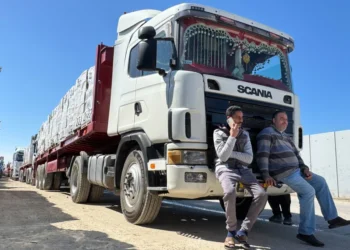Japan’s Cabinet has approved additional sanctions against Russia over its war on Ukraine, including freezing the assets of dozens of individuals and groups and banning exports to dozens of organizations in Russia and several other countries that have allegedly helped it evade sanctions.
Japan has imposed several previous rounds of sanctions, and the latest step comes after Prime Minister Shigeru Ishiba reaffirmed the country’s policy at an online G7 summit in mid-December following Russia’s increased cooperation with North Korea and use of third countries in evading sanctions.
According to a joint statement by Japan’s foreign, trade and finance ministries, 11 individuals, 29 organizations and three banks from Russia, as well as a North Korean trading company executive and a Georgian bank that allegedly helped evade sanctions, were added to an asset freeze list.
The Cabinet approved total export bans on 22 Russian organizations, including ones related to the military, as well as technology and machinery makers.
The measures freeze the assets of such individuals as Pavel Marinychev, Chief of Russian diamond producer Alrosa; Vladimir Artyakov, first Deputy Director General at Rostec State Corporation; Sergey Petrov, Chief of PSV Technologies; Dmitry Nikulin, Vice President of CMRBank; Grigory Grigoriev, Director General of Novelco logistics company; Igor Afanasiev, Head of Elektromashina; Ruslan Bulatov, Director General of Testkomplekt; Andrey Kazazayev, Head of Degtyarev Plant; Vasily Shupranov, Head of Nizhny Novgorod Machine Building Plant; Rafael Gazaryan, identified as the owner of Rafort; and Alexey Budnev, identified as the owner of Tekhnologiya.
In terms of organizations, the measures target Moscow Institute of Thermal Technology, NPO Mashinostroyeniya, Aleksin Chemical Plant, Design Bureau Turbina, All-Russian Scientific Research Institute of Radio Engineering, the Interstate Joint Stock Corporation Vympel, Granit Enterprise, which is a subsidiary of Almaz-Antey, Klimovsk Specialized Ammunition Plant, Mari Machine Building Plant, the Kazan and Tambov gunpowder factories, the Russian Institute of Radionavigation and Time, CMRBank, RFK Bank and Timer Bank, among other entities.
Export restrictions will also be applied to 31 non-Russian groups that the government says helped Russia to divert restricted goods and evade sanctions — 11 based in Hong Kong, seven in mainland China, eight in Turkey, two in Kyrgyzstan and one each in Thailand, the UAE and Kazakhstan.
It also approved a list of 335 items that cannot be exported to Russia, effective January 23, 2025.
That list includes construction vehicle engines and components, motorized bicycles, communication and acoustic devices, and mechanical tools and valves, according to the trade and industry ministry.
The additional sanctions and export restrictions are in line with the G7’s effort to prevent Russia from evading sanctions with help from third countries and include a ban on exporting materials that could help strengthen Russia’s industrial base, Hayashi said.
Japan has closely cooperated with the G7 in imposing sanctions against Russia and supporting Ukraine amid growing concern about the war’s impact on Asia, where China has threatened to use force to exert its control over Taiwan.
A Show Of Japan’s Commitment To G7 Efforts

Chief Cabinet Secretary, Yoshimasa Hayashi stressed that the approval of the additional sanctions shows Japan’s commitment to efforts by the Group of Seven leading industrialized nations to strengthen sanctions against Russia for its invasion of Ukraine.
“It is Japan’s contribution as part of the international effort toward achieving global peace and resolving the problems surrounding Ukraine because of the Russian invasion.”
Yoshimasa Hayashi
The Japanese government imposed several packages of sanctions against Russia after the start of the special military operation in Ukraine.
According to Russian Ambassador to Japan Nikolay Nozdrev, Tokyo essentially went for a complete dismantling of relations with one of its main neighbors, deciding that the costs of it would be less than the benefits of joining the anti-Russian campaign launched by the West.
READ ALSO: President Mahama Demands Immediate Investigation of 2020 and 2024 Elections Deaths





















